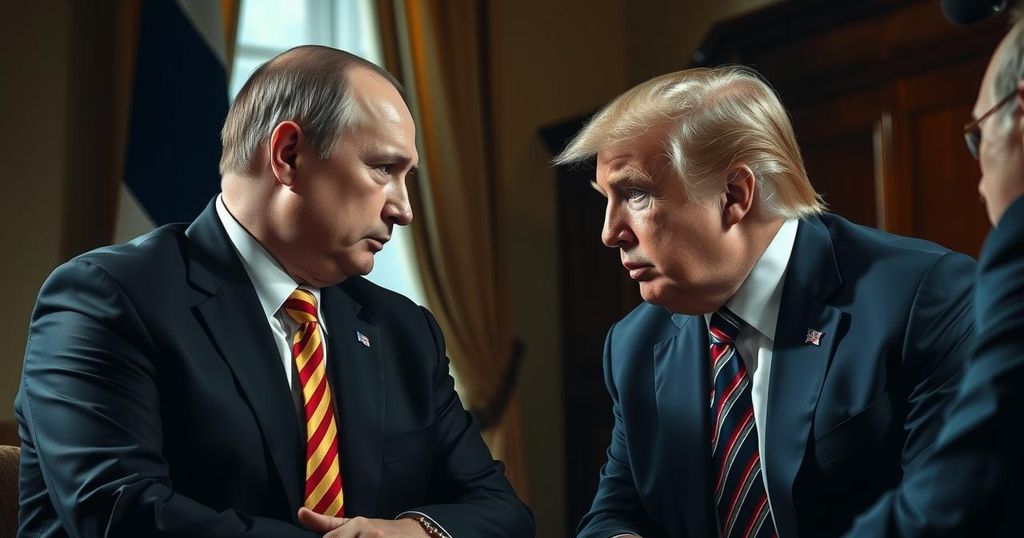Following Donald Trump’s electoral victory, Russian President Vladimir Putin appears to be trying to manipulate him psychologically. Delaying his congratulations and insinuating obligations from Trump’s campaign, Putin’s actions underscore a strategy to exert influence. Additionally, Russia’s past electoral interference exemplifies the potential threats to Western democracy. As Trump seeks to realign U.S.-Russia relations, the complexities of this relationship may challenge his administration’s foreign policy and decision-making.
In the aftermath of Donald Trump’s electoral victory, it seems that Russian President Vladimir Putin is already attempting to exert influence over the newly elected president. Notably, Putin delayed his congratulations to Trump for two days, which may have led Trump to question why the man he has admired for so long was silent amidst a flurry of international accolades. When the two eventually had a phone conversation, Trump claimed to have warned Putin against escalating the conflict in Ukraine. However, the Kremlin spokesperson refuted this, stating that no such conversation had taken place. As tensions rise, with reports indicating that Putin may soon deploy thousands of additional troops to Ukraine, Trump may come to understand that Putin’s national interests supersede personal relationships. Compounding this situation, Russian Intelligence Chief Nikolai Patrushev implied in a recent interview that Trump’s electoral success could implicate him in obligations to certain Russian interests, insinuating that Trump owes a debt given alleged Russian assistance in his campaign. This raises the alarming prospect of psychological manipulation and potential blackmail, especially considering recent evidence of Russian interference in the electoral process, such as counterfeit videos and deceptive tactics aimed at undermining voter support for the opposition. While there is no concrete evidence of Trump’s complicity in these activities, the commentary from Patrushev serves as a stark reminder of Russia’s overarching strategy: to foster discord and disrupt democratic processes in the West, particularly targeting the United States. Trump’s historical skepticism regarding multi-national alliances and his inclination towards Russia might complicate U.S. foreign policy moving forward, particularly as it pertains to military aid to Ukraine. The MAGA faction of the Republican Party aligns closely with Trump’s vision for rekindling positive relations with Russia, focusing instead on the perceived threat posed by China. With forthcoming appointments reflecting this ideology, concerns about Trump’s perception of Putin’s intentions highlight the pivotal question of whether Trump can realign his views upon realizing that Putin may not be the ally he once believed him to be.
The political dynamics between Donald Trump and Vladimir Putin are under scrutiny following Trump’s recent electoral success. Given Trump’s admiration for Putin, his policies and decisions may be significantly affected by Putin’s maneuvers on the global stage. Russia’s history of electoral interference and the geopolitical implications of Trump’s administration represent a delicate situation, further compounded by Trump’s Republican alignment towards reducing tensions with Russia while actively confronting China. Recent intelligence reports have pointed to a continued Russian strategy aimed at destabilizing Western democracies. The implications of these foreign influences could shape Trump’s foreign policy priorities, particularly regarding Ukraine, NATO, and international alliances. As events unfold, understanding the historical context of Trump’s relations with Russia can provide insights into the potential challenges that lie ahead for his governance.
In summary, the emerging relationship dynamics between Donald Trump and Vladimir Putin present numerous challenges for U.S. foreign policy. Putin’s apparent efforts to manipulate Trump, coupled with the insinuations made by Russian officials regarding Trump’s obligations, indicate a precarious balance between personal admiration and national interests. As Trump navigates this complex landscape, it remains to be seen how these external influences will shape his administration’s approach to international relationships, particularly with Russia and Ukraine. Recognizing the broader implications of these interactions may be crucial for preserving democratic integrity and strategic alliances moving forward.
Original Source: slate.com






